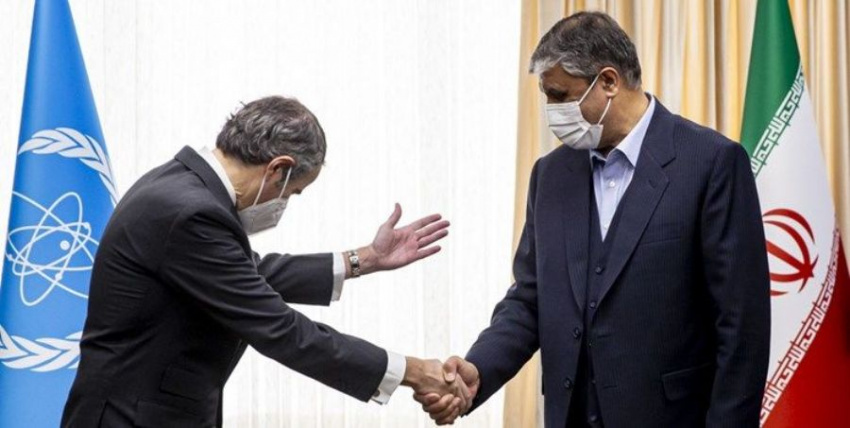Iran-West tensions to be controlled with Grossi's visit?

Iranian Diplomacy: The outcome of each episode of the long series of visits by the Director General of the International Atomic Energy Agency (IAEA) to Tehran at times such as the eve of the quarterly meeting of the Board of Governors reminds of the diplomatic adage saying that: negotiations are bound to fail within one meter of conclusion. It seems that there is no clear prospect for this long series in the near future.
Some have interpreted Grossi's recent invitation to Tehran as " last minute diplomacy", but it is probably more correct that this invitation and its acceptance by the Director General of the Agency and the reception of all the nuclear negotiating parties with Iran is a kind of joint effort to "control" the situation before any "confusion" caused by the deepening of differences.
The current disputes fall under the rubric of extra-JCPOA issues, intensifying at every stage after the suspension of the nuclear talks in Vienna (from August 2022 until now). Therefore, it seems that the new round of Grossi's negotiations in Tehran is not limited to technical issues, but includes a wider range of even safeguard disputes. Of course, this is a possibility and we have to wait for the actual outcome.
What is important about the upcoming visit of the Director General of the Agency to Tehran is the sudden change in the tone of all parties and their refrainment from expressing harsh and critical rhetoric to softness. In other words, by understanding the consequences of radicalization of discourse, the parties have put a new plan not in terms of managing the situation, but in controlling it.
The reason for this is the lack of a clear road map in the event of a complete failure of the talks. Therefore, in recent days, we have seen a softening of the psychological and propaganda pressures of all Western parties against Tehran. The most important manifestation of this approach is the European Union's avoidance of the pressure of the opponents of the negotiations to enlist the Islamic Revolutionary Guard Corps as a terrorist group, the extension of exemptions for IRIB in the US sanctions list, resistance to public pressure to close the European embassies in Tehran, and the downplaying of human rights issues happening in Tehran.
In addition, the importance of some diplomatic trips in recent days in the region cannot be overlooked. This includes the trip of FM Hossein Amir-Abdullahian and his Saudi counterpart to Iraq; The trip of "Robert Malley", the special interlocutor of the "Joe Biden" government in the nuclear negotiations, to Oman and the possible trip of the Sultan of Oman to Tehran show some modifications in approaches, the results of which will gradually re-place control in the hands of diplomacy.
Diplomacy is the art of doing the impossible. It seems that new diplomatic approaches, on the one hand, seek to control the situation that is getting out of hand for various reasons. On the other hand, the hope of all parties from the new measures is to create an opportunity to restore diplomacy in the extremely tense mode of interactions betwen European and the US capitals vis-a-vis Tehran. In this case, there will be hope to bring thaw to JCPOA talks and prevent its untimely death in the light of the re-emergence of path-breaking diplomacy. But does this mean a return to 2015? That appears to be too rosy a picture.
Wall Street Journal which usually reports on the process of negotiations with precision, in one of its latest reports about the upcoming quarterly meeting of the Board of Governors, has reported that in his quarterly report on the nuclear file of Iran, the Director General of the Agency will not report the issue of 84% uranium enrichment by Iran in a separate report, but in his quarterly report which will lead to issuance of a third resolution this year on Iran's nuclear activities. Tehran has invited Grossi to come to Tehran in order to prevent this situation and influence Grossi's report. The head of Iran's Atomic Energy Organization stated in a preface for this trip that "we will not give them an excuse."
The meaning of this quote could contain clear answers to the Director General of the IAEA. At the same time, it is a reflection of Tehran's desire to reduce tension with the international nuclear watchdog over long-term differences over safeguard issues. The West's preference at the moment and as an immediate solution to control the situation is to freeze Iran's nuclear capability at the current state, in other words, reaching a limited agreement that does not necessarily approximate the 2015 JCPOA.
Whether or not the current "hidden diplomacy" and regulating tensions between Tehran and the West will result in a return to the "controllable" point or not is dependent on two conditions: first, the results of Grossi's negotiations in Tehran and the quality of the quarterly report that he presents to the Board of Governors; second, the resolution that we will pass afterwards which will make the future clearer for observers.

